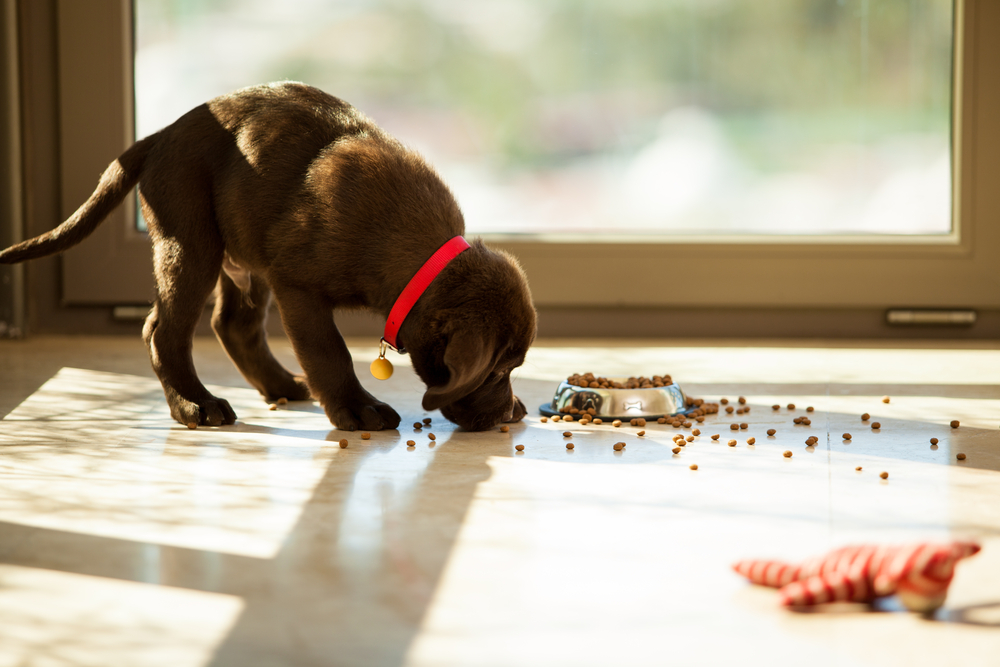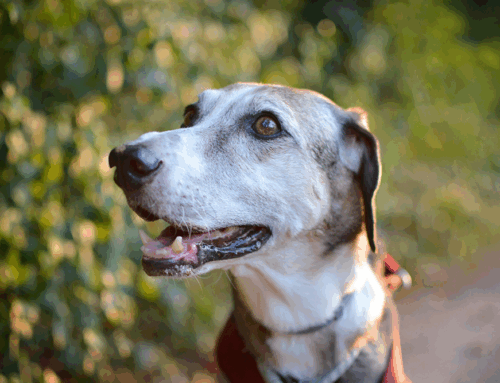A new puppy is a wonderful addition to any pet-loving family’s home. Puppies are roly-poly and adorable, but they require great care, attention, and training to become happy, well-behaved dogs. Your puppy’s nutrition is essential for their development, and a balanced diet helps them remain healthy.
Most puppies rely on nutrients from their mother’s milk until about 4 weeks of age when they are ready to transition to puppy food. Puppies, like adult dogs, are omnivores whose diet consists of meat, protein, healthy grains, vegetables, fats, and essential vitamins and minerals. To ensure your furry little pal is off to their best start in life, follow our Cane Bay Veterinary Clinic team’s seven puppy nutrition tips.
#1: Provide high-quality puppy food
With your veterinarian’s guidance, you can choose a puppy food that meets your furry pal’s unique nutrition needs. You should not feed your puppy adult dog food, because the diet is inadequate for the rapid growth they will experience during their first year. Give your little furry pal a diet that is labeled complete and balanced for the puppy life stage. Many reputable puppy food manufacturers exist, but our team recommends Purina Pro Plan Vet Direct, which is cost-effective and can be delivered to your door.
#2: Feed according to your puppy’s breed, size, and age
You may be tempted to give your hungry and growing puppy extra food, but you must stick to their feeding requirements. Puppies have different nutritional requirements at various growth stages, and these needs can change within a matter of weeks. Consult your Cane Bay Veterinary Clinic veterinarian to determine the appropriate feeding schedule and portion size based on your puppy’s age, breed, size, and activity level. Large-breed puppies, for example, may require a diet with controlled levels of certain nutrients to support healthy bone development and prevent rapid growth-related bone conditions.
#3: Monitor your puppy’s body condition score
Your puppy’s body condition plays a vital role in evaluating their overall health. The body condition score (BCS) measures your puppy’s body composition, ranging from underweight to obese, on a simple one to nine scale. Body condition factors in muscle definition, body shape, and fat present. The American Animal Hospital Association (AAHA) offers a quick-glance scorecard and is a good resource for determining your pet’s body condition. When assessing your pet’s condition, you should be able to feel their ribs without pressing too hard, and they should have a visible waist when viewed from above. Overfeeding any pet, whether they’re puppies or adults, can lead to obesity and related health problems, while underfeeding can result in stunted growth and nutritional deficiencies.
#4: Avoid feeding your puppy table scraps
While sharing your meals with your puppy may be tempting, especially when we see those big, begging eyes, many human foods can harm dogs. Some common foods are toxic such as:
- Chocolate
- Grapes and raisins
- Onions and garlic
- Macadamia nuts
- Avocado
- Alcohol
- Caffeine
- Xylitol (i.e., a sugar substitute found in sugar-free candies and gum)
Additionally, table scraps can contribute to obesity or upset your puppy’s sensitive stomach. Stick to feeding your puppy their specially formulated food to ensure they receive the nutrients they need without harming their health.
#5: Limit your puppy’s treats

Treats are extremely helpful when training your tiny canine friend, providing enticement for good behavior and rewards for being a good boy or girl. However, be careful not to overdo the treats. Treats should contribute no more than 10% of your puppy’s daily caloric intake. Ensure you include these calories when you calculate your furry pal’s daily nutrition requirements.
#6: Provide your puppy with plenty of fresh water
Always ensure fresh, clean water is available for your puppy. Hydration is essential for organ health and overall well-being. Regularly clean their water bowl to discourage bacterial growth and refill it with fresh water throughout the day.
#7: Gradually transition from puppy to adult foods
When you need to change your puppy’s diet to an adult formula, gradually mix a small amount of the new food with their current food. Gradually increase the proportion of their adult food while decreasing their puppy food.
Proper nutrition plays a critical role in ensuring your growing puppy’s health, vitality, and energy. By following these nutrition tips and consulting with our Cane Bay Veterinary Clinic team, you help ensure your furry friend lives a long, healthy, and tail-wagging good life. Schedule your puppy’s important first-year appointments with our team.







Leave A Comment